Category / Uncategorized
Kindness Matters event, tomorrow!
Following on from the successful Service Excellence Conference held in April, we are holding a further event to build on the theme of kindness. If you are an academic interested in kindness or undertaking research which is linked to kindness please come along to a follow up event on 7th June 10-3 to share your interests and to explore ways in which we can work across the university to develop the theme of ‘kindness’ further.
The event will explore kindness and self-kindness and will include a holistic appreciation of self and others. Alongside practical sessions to explore the concepts of kindness and self-kindness, the day will provide a creative space for academics and professional service staff to come together to explore synergies in research and practice development activities linked to kindness. We hope the event will provide a springboard for future co-creation around kindness across the university.
To book your place, please contact od@bournemouth.ac.uk

Ground-breaking article by Jones and Fenge
 Kip Jones and Lee-Ann Fenge are pleased to announce that our article to appear shortly in Creative Approaches to Research, a peer-reviewed open-access journal, “Gift Stories How Do We Retell the Stories that Research Participants Give Us?” is now available on BRIAN.
Kip Jones and Lee-Ann Fenge are pleased to announce that our article to appear shortly in Creative Approaches to Research, a peer-reviewed open-access journal, “Gift Stories How Do We Retell the Stories that Research Participants Give Us?” is now available on BRIAN.
We passionately believe that as narrative researchers and storytellers we must promote narrative in the content and styles of our publications. To revert to a style of publication or presentation that is counter to this does a disservice to our commitments as narrativists.
We can no longer afford to ignore the great advances made in representation of qualitative data. These have been overwhelmingly demonstrated by the successes achieved in auto-ethnography, poetic enquiry, ethno-drama, film, Performative Social Science and/or other arts-based efforts in research and dissemination.
Next ADRC Research Meeting Dr Ellen Seiss 8 June F111 (11.15am)
Thank you to those that attended the first ADRC Research Meeting in May. We kicked off with three interesting and humorous presentations (the ignite style moving the slides on so quickly was very entertaining) from our theme leaders:
- Ageing and Dementia Friendly Environments – Prof Jan Wiener
- Nutrition and Well-being – Prof Jane Murphy
- Activity and Social Inclusion – Dr Ben Hicks
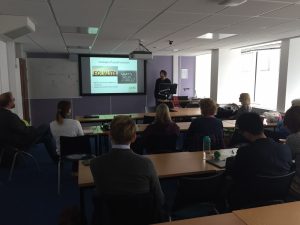
We continue with the next ADRC Research Meeting taking place at 11.15am, on 8th June 2017 in F111 (Fusion, Talbot Campus). We welcome Dr Ellen Seiss, Senior Lecturer in Psychology at Bournemouth University to talk about her research in cognitive and clinical neuroscience. Ellen conducted her PhD in sensorimotor function in Parkinson’s and Huntington’s disease. Her other research focuses on other disorders such as OCD and stroke, and an interest in the effect of glucose on cognitive function.
Ellen is currently involved in an m-health related EU Horizon 2020 project with Parkinson’s disease patients (called PD Manager) and was a co-chair for the Surrey Parkinson’s disease Research Collaboration (SPaRC) between 2012 and 2015. SPaRC’s aim was to stimulate research between two university hospitals and two universities. She also leads the ageing and neurodegenerative disorders unit in the MSc in Clinical and Developmental Neuropsychology.
We look forward to seeing you there.
Ageing and Dementia Research Centre
My voice, my story: the lived experience of being a non-traditional student at university
The Fair Access Research (FAR) team have been working with students to explore what it means to be a non-traditional student at university through the student voice, using photovoice, a participatory photographic and story technique.
The undergraduates involved in the research, who were from widening participation (WP) backgrounds, became research co-creators. They took photographs to represent their experiences of being a non-traditional student in higher education which they shared within their group then explored and analysed further together. The students then wrote short excerpts relating to their individual photographs.
The stories and photographs were then shared at a workshop as part of the Economic and Social Research Council (ESRC) Festival of Social Science held at BU. Academics and WP practitioners from a variety of different universities attended the workshop to interpret and explore the impact of the students’ stories. Participants engaged in co-creation, listening to students’ voices, learning from their stories, hearing about the photovoice research method and working together to develop practical responses to some of the challenges which the stories presented.
The themes which emerged through an analysis of the research data include the concepts of transition, connectedness and the journey. The images and associated stories told by the students were then shared with a group of BU media students who created the video montage above.
One of the central tenets of the photovoice method is that the participatory approach is used to inform policymakers so that meaningful policy changes can be shaped in unison with the lived experiences of the communities the policies are intended to serve. Listening to students’ voices and hearing students’ own stories of their lived experiences of university can help ensure that policies are developed and implemented that work with the lives and needs of non-traditional students.
The video has been posted on the ESRC website and on the BU YouTube channel
Part of the ‘Experience’ theme, one of five themes in the Fair Access Research project.
user led research event – 6 places left
The PIER partnership (Public Involvement in Education and Research) are hosting a sandpit event with RKEO on 20th June 9.30-4pm to bring together service users, carers and researchers to explore and generate ideas for user led and user generated research. Speakers confirmed from Involve and the Patients Association. There are just 6 places left for academics who are keen to explore research ideas with service users and to help us to develop ways of supporting user led research. If you would like to be involved, please contact Dr Mel Hughes, Academic lead for service user and carer involvement mhughes@bournemouth.ac.uk
HE policy update w/e 26th May 2017
Dear all
The horrors of the Manchester bombing rightly paused the party bickering this week as each party announced it was suspending campaigning.
The role of EU funding in UK research and innovation
This week the role of EU funding in UK research and innovation has hit the headlines. A new report by Technopolis Group, commissioned by the UK national Academies – the Academy of Medical Sciences, British Academy, Royal Academy of Engineering and the Royal Society – gives an analysis of the academic disciplines most reliant on EU research and innovation funding. The report highlights that of the 15 disciplines most dependent on EU funding, 13 are within the arts, humanities and social science sphere. Most dependent as a proportion of their total research funding are Archaeology (38% of funding), Classics (33%) and IT (30%) (see table below).
The full report dissects the information further considering the funding across disciplines, institutions, industrial sectors, company sizes and UK regions. It differentiates between the absolute value of research grant income from EU government bodies, and the relative value of research grant income from EU government bodies with respect to research grant income from all sources, including how EU funding interacts with other funding sources. There are also 11 case studies, including archaeology and ICT. See the full report page 25 for particular detail on ICT and digital sector, and page 39 for archaeology. For press coverage see the Financial Times article.
Student resilience: Keen readers of the Wonkhe blogs will have noticed their fondness for the discourse on student resilience. This week there is another article on the topic (Student Resilience – it’s all about empowerment) which coincides with the release of Unite Students’ report Student Resilience: Exploring the positive case for resilience. The report aims to encourage greater debate, exploration and fresh perspectives within the context of the growing national emphasis and recognition of student mental wellbeing.
Social Mobility: The UPP Foundation and Bridge Group report Social Mobility and University Careers Services addresses why students from lower socioeconomic backgrounds earn less than their richer counterparts. Wonkhe summarise the report which concludes that “university participation does not have the levelling effect that was previously assumed”, and that efforts to improve social mobility are disproportionately focused on promoting access to higher education rather than success after studying. It cites reasons such as unpaid internships, geographical immobility, uneven participation in extracurricular activities, and lack of investment in careers services, and argues that there is considerable work to be done on reducing the gap. Included in the report’s recommendations is that NUS should support students’ unions to collect diversity data on sports clubs and societies, which it argues are a significant means of acquiring sought after employability skills. It further recommends that students’ unions and universities work to close the ‘participation gap’ in extra-curricular activities between students from different social backgrounds.
Transparent Taxation: A thought provoking piece in The Conversation challenges the readership to look beyond the slogans and consider the PM’s claims that the Conservative / Labour divide represents Low Vs High Taxation. The article highlights the less egalitarian effects of raising VAT under Conservative leadership and recognises that taxation levels are often a response to the economic climate of the time, transcending party politics.
General election 2017
This week’s focal election piece considers the incumbents and local candidates that will contest the Dorset constituencies in two weeks’ time. It’s a long table – so you can read it on the intranet through the link here.
Research Staff Association coffee morning 31.05.17 – theme networking and collaboration
The next BU Research Staff Association coffee morning is focused on networking and collaboration.
We are delighted to welcome guest speaker Professor Edwin van Teijlingen to share his knowledge and experience in this area.
- Date: 31 May 2017
- Time: 10-11am
- Venue: Well-being Centre, Bournemouth House, Lansdowne Campus.
We look forward to seeing you there.
BU Research Staff Association
Researchers – we need you…!
If that got your attention then keep reading – it gets better!
We need some more researchers from across Bournemouth University (BU) to join us in The Curiosity Playground (part of this year’s Festival of Learning). The Curiosity Playground celebrates the creative, fun and wacky research happening at BU. The purpose of this event is to increase public awareness of the spectrum of research that BU conducts, and the key message is that research is fun, interesting and amenable to all.
There is even some funding available to help develop props to showcase your research (and you get to keep them afterwards so you can use them for other events too).
So what are you waiting for GET INVOLVED!!!!
For more information please contact Michelle Heward mheward@bournemouth.ac.uk
BU Research Staff Association
Media short course framework fosters ‘fused’ research
Last Friday and Saturday three courses ran as part of the Media CPD Short Course Framework: Managing Creativity and Innovation, Media Coverage of Extremism, and the Master’s Project. After the two-day intensive residential all students returned to their respective workplaces to begin professionally oriented (fused) research projects which, in the past, have seen students on this programme drive change in their organisations. Seen here, enjoying ‘networking drinks’ after day one are some of the students and tutors (L to R): Tobi Adesuyi (Channel 4); Peter Bloore (Managing Creativity tutor); Newton Velji (Edinburgh International Television Festival Committee); Mark Readman (Master’s Project tutor); and Mukundi Lambani (Brainbow Productions, Johannesburg).
For more information, or if you’re interested in developing a course, contact Mark Readman.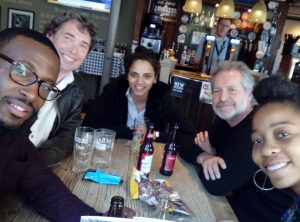
Policy and political scene this week: 25 May 2017
Welcome to this week’s political scene within research. Here is a summary of the week’s generic policy reports and releases, alongside new niche consultations and inquiries.
The role of EU funding in UK research and innovation
This week the role of EU funding in UK research and innovation has hit the headlines. Its an analysis of the academic disciplines most reliant on EU research and innovation funding at a granular level.
Jointly commissioned by Technopolis and the UK’s four national academies (Medical Sciences, British Academy, Engineering and Royal Society) it highlights that of the 15 disciplines most dependent on EU funding 13 are within the arts, humanities and social science sphere.
Most reliant on the EU funding as a proportion of their total research funding are Archaeology (38% of funding), Classics (33%) and IT (30%).
The full report dissects the information further considering the funding across disciplines, institutions, industrial sectors, company sizes and UK regions. It differentiates between the absolute value of the research grant income from EU government bodies, and the relative value of research grant income from EU government bodies with respect to research grant income from all sources, including how the EU funding interacts with other funding sources.
There are also 11 focal case studies, including archaeology and ICT. Here’s an excerpt from the archaeology case study considering the risks associated with Brexit and the UK’s industrial strategy:
“As archaeologists are heavily dependent on EU funding, a break away from EU funding sources puts the discipline in a vulnerable position. This is exacerbated by the fact that the UK is short of archaeologists and/or skilled workers active in the field of Archaeology because of the surge in large scale infrastructure projects (e.g. HS2, Crossrail, and the A14), which drives away many archaeologists from research positions.” Source
See the full report page 25 for particular detail on ICT and digital sector, and page 39 for archaeology. For press coverage see the Financial Times article.
Bathing Water Quality
The European Environment Agency published European Bathing Water Quality in 2016. It sees the UK as second to bottom in the league table for quality of bathing water. While 96.4% of British beaches were found safe to swim in last year 20 sites failed the annual assessment. Only Ireland had a higher percentage of poor quality bathing waters at 4%.
Report link: https://www.eea.europa.eu/publications/european-bathing-water-quality-in-2016
How and when to submit evidence to policy makers
This week Research Professional ran a succinct article encouraging researchers to think more about when and how they submit evidence to policy makers. Timing is key, policy makers often want information instantaneously and the article urges researchers to be responsive but pragmatic, including a pro-active approach of gently keeping key policy makers informed of new developments.
Researchers wanting to have a political impact may consider attending a UK Parliament Outreach and Engagement Service events.
Consultations and Inquiries
Responding to a select committee call for evidence is a great way for academics to influence UK policy. If you respond to a consultation or inquiry as a BU member of staff please let us know of your interest by emailing policy@bournemouth.ac.uk at least one week before you submit your response.
This week there are three new inquiries and consultations that may be of interest to BU academics.
Sports
A Scottish Parliament inquiry is seeking individual’s views on community-based approaches to removing barriers to participation in grassroots sport and physical activity, including how to promote volunteering. The committee is asking for views and examples on a range of questions, including:
- Examples where a community based approach has been successful in removing barriers to participation in sport and physical activity?
- Approaches that were particularly successful in increasing participation among certain social groups, like women, ethnic minorities, certain age-groups?
- The barriers facing volunteers and how can they be overcome? The aim is to inform how Scotland might increase participation rates across all groups and sectors of society, respondents can select to answer only the most relevant questions.
The call for evidence closes on 30 June.
Body Image
The British Youth Council has opened an inquiry into body image and how the growth of social media and communications platforms has encouraged attitudes that entrench poor body image. Included among the inquiry questions are:
- Has the growing use of social media and communications platforms amongst young people encouraged practices and attitudes that entrench poor body image? What is the link between “sexting” and body dissatisfaction?
- Do internet companies, social media platforms or other platforms have a responsibility to tackle trends which entrench poor body image? What are they already doing in this area? What more should they be doing?
- Are particular groups of young people particularly prone to poor body image, or less likely to seek help? What causes these trends?
- In relation to young men and boys, minority ethnic groups, and those who self-identify as transgender: what are the specific challenges facing young people in these groups? How effective is existing support?
- To what extent is dissatisfaction with body image contributing to the increase in mental health problems amongst children and young people?
The call for evidence closes on 16 June.
Drainage & Flooding
The Welsh government has opened a consultation on the implementation of sustainable drainage systems on new developments (schedule 3 of the Flood and Water Management Act 2010).
The consultation closes on 11 August.
HE Policy Update
You can also sign up to receive BU’s separate weekly HE policy update delivered direct to your inbox each Friday by emailing policy@bournemouth.ac.uk
Sarah Carter
Policy & Public Affairs Officer
Remembering Rio Paralympics
As part of an AHRC funded research project – we are seeking participants for focus group discussions about the last Paralympic games in Rio – we would appreciate it if you could circulate this call to any local contacts or networks you have. To be clear we are not seeking BU staff to join these focus groups. Thanks
Remembering Rio and the Paralympics
We’re keen to hear about your memories and experiences of watching the Paralympic Games last summer. If you would like your voice to be heard as part of a 2-year project researching the impact and legacy of the Paralympics, then get in touch and join one of our small friendly focus group discussions taking place during the weeks of June 12th and June 19th 2017.
Location: –
BU Fusion Building
Bournemouth University Talbot Campus
Fern Barrow, Poole, BH12 5BB
Car parking and refreshments will be provided.
To thank you for your time and effort each participant will receive an M&S voucher to the value of £15.00
For more information and to register your interest please call us now on 01202 965046 or email cmartins@bournemouth.ac.uk
We look forward to some lively discussion!
Press release INASP highlights BU research paper
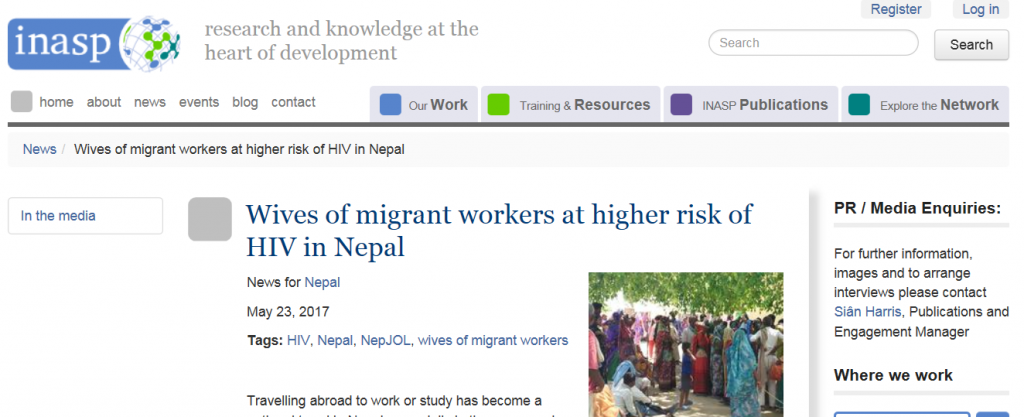 INASP, an Oxford-based organisation, aims to improve access to, and production and use of, research information and knowledge for sustainable development. Part of their approach is the Journals Online project which increases the accessibility and visibility of developing-country research. The Journals Online project includes a set of journals published Open Access in Nepal, know as NepJOL. On of the journals in the stable of NepJOl is the SAARC Journal of Tuberculosis, Lung Diseases & HIV/AIDS. Journals selected for inclusion on the Journals Online project must be:
INASP, an Oxford-based organisation, aims to improve access to, and production and use of, research information and knowledge for sustainable development. Part of their approach is the Journals Online project which increases the accessibility and visibility of developing-country research. The Journals Online project includes a set of journals published Open Access in Nepal, know as NepJOL. On of the journals in the stable of NepJOl is the SAARC Journal of Tuberculosis, Lung Diseases & HIV/AIDS. Journals selected for inclusion on the Journals Online project must be:
- scholarly in content, and contain original research;
- peer reviewed and quality controlled;
- able to provide all necessary content in electronic format (tables of contents, abstracts and PDFs of full text);
- published, managed and developed within their respective country.
Yesterday INASP selected a paper published late last year and co-authored by two Bournemouth University academics for a special press release. The press release can be found here! This press release highlights our recently published paper in the SAARC Journal of Tuberculosis, Lung Diseases & HIV/AIDS. Our paper ‘Knowing is Not Enough: Migrant Workers’ Spouses Vulnerability to HIV’ argues that despite having generally a good knowledge and awareness of HIV and risk associated with migration and HIV; migrants’ wives could not discuss sexual health issues with their husbands, thus increasing their vulnerability to HIV and other sexually transmitted infections [1].
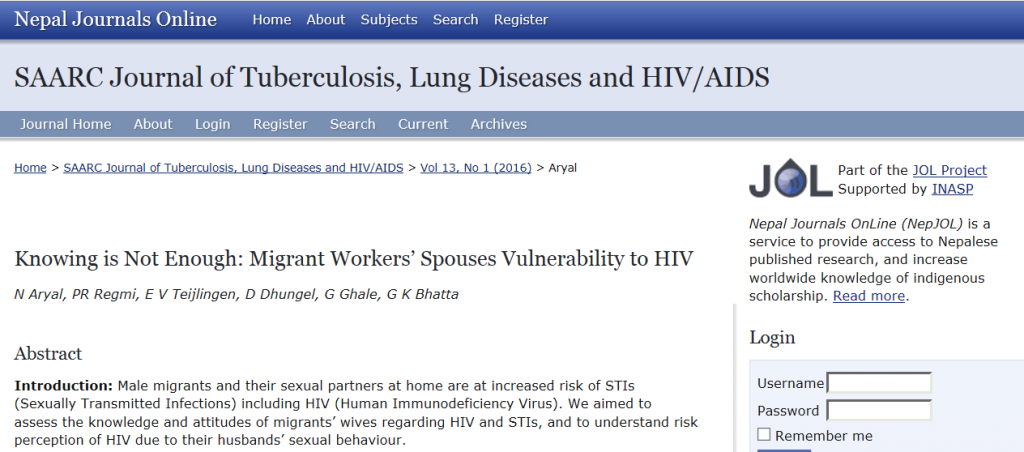 Dr. Pramod Regmi, Post-Doctoral Research in the Faculty of Health & Social Sciences is quoted in the press release as saying: “knowledge alone would not be sufficient to fight against the spread of HIV/STI among wives of migrant workers.” This paper is an addition to a range of papers on health and well-being of Nepali migrant workers produced by BU academics [2-6].
Dr. Pramod Regmi, Post-Doctoral Research in the Faculty of Health & Social Sciences is quoted in the press release as saying: “knowledge alone would not be sufficient to fight against the spread of HIV/STI among wives of migrant workers.” This paper is an addition to a range of papers on health and well-being of Nepali migrant workers produced by BU academics [2-6].
Prof. Edwin van Teijlingen
References:
- Aryal, N., Regmi, P.R., van Teijlingen, E., Dhungel, D., Ghale, G., Bhatta, G.K. (2016) Knowing is not enough: Migrant workers’ spouses vulnerability to HIV SAARC Journal of Tuberculosis, Lung Diseases & HIV/AIDS 8(1):9-15.
- Adhikary, P., Simkhada, P.P., van Teijlingen E., Raja, AE. (2008) Health & Lifestyle of Nepalese Migrants in the UK BMC International Health & Human Rights 8(6). Web address: www.biomedcentral.com/1472-698X/8/6.
- Adhikary P., Keen S., van Teijlingen E (2011) Health Issues among Nepalese migrant workers in Middle East. Health Science Journal 5: 169-175. www.hsj.gr/volume5/issue3/532.pdf
- Sapkota, T., Simkhada, P., van Teijlingen, E. (2014) Nepalese health workers’ migration to United Kingdom: A qualitative study. Health Science Journal 8(1):57-74.
- Simkhada, P.P., Regmi, P.R., van Teijlingen, E., Aryal, N. (2017) Identifying the gaps in Nepalese migrant workers’ health and well-being: A review of the literature, Journal of Travel Medicine 24 (4): 1-9.
- Aryal, N., Regmi, P.R., van Teijlingen, E., Simkhada, P., Adhikary, P., Bhatta, Y.K.D., Mann, S. (2016) Injury and Mortality in Young Nepalese Migrant Workers: A Call for Public Health Action. Asian-Pacific Journal of Public Health 28(8): 703-705.
Delivering DEALTS 2!
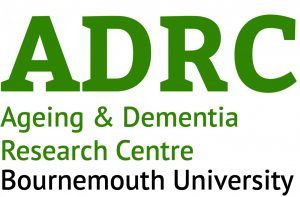

Health Education England (HEE) has commissioned Bournemouth University to deliver a new ‘‘Train the Trainers’ enhanced education programme called ‘Dementia Education and Learning Through Simulation’ 2 (DEALTS 2). This builds on previous work undertaken in 2013/14 by HEE to ensure healthcare professionals understand and can deliver key competencies according to the Dementia Core Skills Education and Training Framework at TIER 2 (Skills for Health and Health Education England, 2015).
Prof Jane Murphy, Dr Michele Board, Dr Michelle Heward and Ashley Spriggs from the Ageing and Dementia Research Centre (ADRC) delivered the first pilot session in Oxford on 10th May 2017. This interactive day was really well received and included attendance by Jan Zietara, Head of Operational Delivery, HEE; Jacqueline Fairburn-Platt, Associate Dean Quality Improvement, HEE Thames Valley as well as Dementia and Quality Improvement Leads. Over the next 2 months another 12 sessions will be delivered to trainers across the HEE regions in England. The delivery of the programme will be evaluated as well as the roll-out across England by the trainers themselves to staff to understand the impact the education is having on practice for the delivery of dementia care. In June the early evaluation work will be supported with the help of a Student Research Assistant, Laurie Emerson. Laurie is currently a final year psychology student in Faculty Sci Tech.

BU’s Sascha Dov Bachmann visits Qatar Armed Forces
Dr Sascha Dov Bachmann, Associate Professor in International Law and Extraordinary Associate Professor in War Studies (Swedish Defence University) visits the Qatar Armed Forces to speak about his work on Hybrid Warfare and the use of law in defensive and offensive operations.
He was invited by the prestigious Joaan Bin Jassim Command and Staff College which has close ties to King’s College London to discuss emerging threat issues in the Gulf region and potential countermeasures.
Sascha will highlight the role of law fare as a potential counter measure and built on his work undertaken on the subject jointly with colleagues from NATO, the Swedish Defence College and the UK Army.
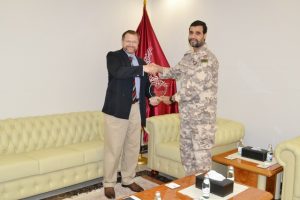
user led research
The BU PIER (Public Involvement in Education and Research) partnership are hosting a sandpit event with RKEO on 20th June 9.30-4pm to bring together service users, carers, community organisations and researchers to explore and generate ideas for user led and user generated research. There are 15 places for researchers who are keen to explore research ideas with service users and to help us to develop ways of supporting user led research. If you would like to be involved, please contact Dr Mel Hughes, Academic lead for service user and carer involvement mhughes@bournemouth.ac.uk
Third Edition of the EU Falls Festival in Amsterdam (8-9 May 2017)
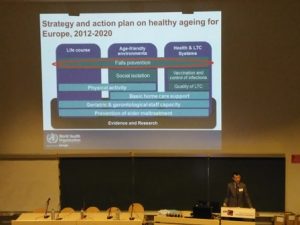
Natalia Adamczewska and Yolanda Barrado-Martín represented the Psychology Department and Ageing & Dementia Research Centre (ADRC) at the Third Edition of the EU Falls Festival in Amsterdam on 8th and 9th May 2017. The theme of the congress was: Developing Collaborations across Professions and throughout Europe.
This festival brought together over 200 professionals from multiple disciplines (such as Nursing, Physiotherapy, Occupational Therapy, Medicine, Psychology and Technology) working under a common target: The prevention of falls amongst older adults. It was a great opportunity to see how different countries in Europe, but also researchers in America, represented by Dr. Robin Lee, US Lead Home and Recreation Team; and Australia, represented by Kim Delbaere, Falls Balance and Injury Centre, NeuRa; are working under this objective, the resources different countries invest on this and the different approaches used from different disciplines. A variety of interventions were presented from educational to exercise, and a debate was organised regarding the relevance of the role of technologies to prevent falls and support research.
Falls are the first external cause of death amongst older adults which explains the importance of researchers, practitioners and policy makers working together. Members of the World Health Organisation and the European Commission were also attending this meeting and sharing their views on the relevance of falls prevention.
Yolanda’s PhD project looks into the acceptability and adherence of participants living with dementia to a Tai Chi exercise intervention. Adherence to falls interventions was one the main concerns of the congress, however, the experiences of those living with dementia remain mostly under-explored.
Natalia focuses on the psychological adjustment to falls in her PhD project and she looks at fall-related PTSD. Various interventions presented at the festival could possibly be applied in order to enable participants to cope with psychological consequences of falling, such as virtual reality treatment presented by Jeff Hausdorff that he originally developed for fall prevention in idiopathic fallers.
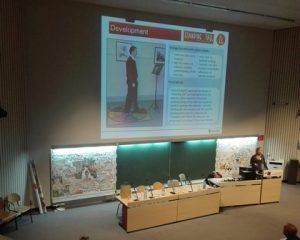
Ben Hicks attends 32nd International Conference of Alzheimer’s Disease International (ADI) in Kyoto, Japan
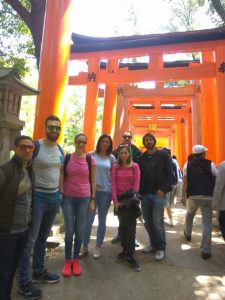 Thanks to funding from the Ageing and Dementia Research Centre (ADRC) and the BU Psychology Department, I recently had the privilege to attend and present at the 32nd International Conference of Alzheimer’s Disease International (ADI) in Kyoto, Japan. The conference is the largest in the dementia field and attracts interest from people all over the world. This includes academics, health and social care practitioners, medical professionals as well as people living with dementia and their care partners. During the conference I spoke about my PhD research that concerns the social inclusion of older men with dementia. I emphasised the importance of understanding men living with this condition as more than just a homogenous, androgynous population, and instead as individuals who maintain (or seek to) their multiple masculinities throughout their experiences of dementia. As such, only through using ecopsychosocial initiatives that cater for these gendered experiences of dementia can we hope to bring about true social inclusion for this hard-to-reach population.
Thanks to funding from the Ageing and Dementia Research Centre (ADRC) and the BU Psychology Department, I recently had the privilege to attend and present at the 32nd International Conference of Alzheimer’s Disease International (ADI) in Kyoto, Japan. The conference is the largest in the dementia field and attracts interest from people all over the world. This includes academics, health and social care practitioners, medical professionals as well as people living with dementia and their care partners. During the conference I spoke about my PhD research that concerns the social inclusion of older men with dementia. I emphasised the importance of understanding men living with this condition as more than just a homogenous, androgynous population, and instead as individuals who maintain (or seek to) their multiple masculinities throughout their experiences of dementia. As such, only through using ecopsychosocial initiatives that cater for these gendered experiences of dementia can we hope to bring about true social inclusion for this hard-to-reach population.
Having presented at the ADI conference in 2013, when I was just starting out on my PhD journey, this opportunity made for a fitting conclusion to what has been an enjoyable(ish) and intellectually rewarding four years of study. I was surprised and heartened to witness that over these past four years, the global understanding of dementia has begun to shift. Unlike in 2013, this most recent conference sought to re-position dementia as a disability and was focussed on the Human Rights and (Social) Citizenship of people living with the condition. It placed more emphasis on the societal changes (rather than the individual) that must be undertaken to enable the social inclusion of people with dementia within communities that are both physically and conceptually ‘dementia-friendly.’ It also highlighted the important role of inclusive research approaches that value the voices of people with dementia as ‘experts by experience’ and position them as ‘active social agents’ rather than passive recipients of care.
With a cure for dementia still a distant realisation, it is essential that these academic messages are successfully translated into ‘on-the-ground’ practice; thereby ensuring the well-being of those living with the condition through the language used to speak about them and the support offered to them. As I continue my employment at BU, post-PhD, these will be my guiding principles as I seek to undertake applied research that promotes these important messages and work alongside people with dementia as co-collaborators to bring about this much needed social change.
Ben Hicks is a Psychology lecturer and an associate of the ADRC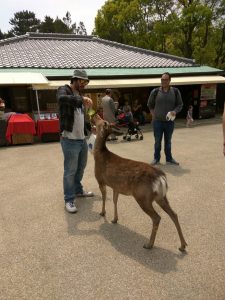













 April’s Café Scientifique – Should we help machines understand and respond to our emotions?
April’s Café Scientifique – Should we help machines understand and respond to our emotions? Postgraduate Research Experience Survey (PRES) 2024 – 2 WEEKS LEFT
Postgraduate Research Experience Survey (PRES) 2024 – 2 WEEKS LEFT Working with The Conversation: online training session – Wednesday 8th May
Working with The Conversation: online training session – Wednesday 8th May Apply for up to £1,000 to deliver an event and take part in a national festival of public engagement with research
Apply for up to £1,000 to deliver an event and take part in a national festival of public engagement with research MSCA Postdoctoral Fellowships 2024
MSCA Postdoctoral Fellowships 2024 Horizon Europe News – December 2023
Horizon Europe News – December 2023